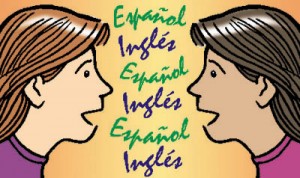 There has been quite a bit of controversy about bilingual education in recent years. As schools have faced reduced budgets in the wake of the economic downturn, one program looked at critically – along with arts and foreign languages – is bilingual education. A recent article in the NY Times suggests that we should instead do all we can to encourage bilingualism: “Speaking two languages rather than just one has obvious practical benefits in an increasingly globalized world. But in recent years, scientists have begun to show that the advantages of bilingualism are even more fundamental than being able to converse with a wider range of people. Being bilingual, it turns out, makes you smarter. It can have a profound effect on your brain, improving cognitive skills not related to language and even shielding against dementia in old age.” This adds to the recent research that indicates that learning a second language late in life can help fend off the onset of Alzheimer’s.
There has been quite a bit of controversy about bilingual education in recent years. As schools have faced reduced budgets in the wake of the economic downturn, one program looked at critically – along with arts and foreign languages – is bilingual education. A recent article in the NY Times suggests that we should instead do all we can to encourage bilingualism: “Speaking two languages rather than just one has obvious practical benefits in an increasingly globalized world. But in recent years, scientists have begun to show that the advantages of bilingualism are even more fundamental than being able to converse with a wider range of people. Being bilingual, it turns out, makes you smarter. It can have a profound effect on your brain, improving cognitive skills not related to language and even shielding against dementia in old age.” This adds to the recent research that indicates that learning a second language late in life can help fend off the onset of Alzheimer’s.
The new research points in the opposite direction from the common view of bilingualism in recent years, namely that a second language hindered a child’s development, interfering cognitively. The new research, interestingly does not really contradict this view: “They were not wrong about the interference: there is ample evidence that in a bilingual’s brain both language systems are active even when he is using only one language, thus creating situations in which one system obstructs the other. But this interference, researchers are finding out, isn’t so much a handicap as a blessing in disguise. It forces the brain to resolve internal conflict, giving the mind a workout that strengthens its cognitive muscles.” In the experiments carried out on bilingualism, bilinguals did better than monolinguals at solving a variety of mental puzzles. The improvement in cognition points to a heightened ability to monitor the environment. Having to switch back and forth between languages requires speakers to keep track of who and what’s around them – so they can speak English to Mom and Spanish to Dad, for example. The good news for language learners: “The bilingual experience appears to influence the brain from infancy to old age and there is reason to believe that it may also apply to those who learn a second language later in life.”